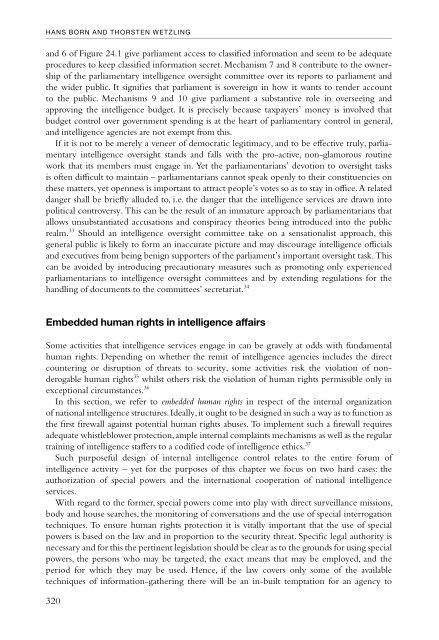Handbook of intelligence studies / edited by
Handbook of intelligence studies / edited by
Handbook of intelligence studies / edited by
You also want an ePaper? Increase the reach of your titles
YUMPU automatically turns print PDFs into web optimized ePapers that Google loves.
HANS BORN AND THORSTEN WETZLING<br />
and 6 <strong>of</strong> Figure 24.1 give parliament access to classified information and seem to be adequate<br />
procedures to keep classified information secret. Mechanism 7 and 8 contribute to the ownership<br />
<strong>of</strong> the parliamentary <strong>intelligence</strong> oversight committee over its reports to parliament and<br />
the wider public. It signifies that parliament is sovereign in how it wants to render account<br />
to the public. Mechanisms 9 and 10 give parliament a substantive role in overseeing and<br />
approving the <strong>intelligence</strong> budget. It is precisely because taxpayers’ money is involved that<br />
budget control over government spending is at the heart <strong>of</strong> parliamentary control in general,<br />
and <strong>intelligence</strong> agencies are not exempt from this.<br />
If it is not to be merely a veneer <strong>of</strong> democratic legitimacy, and to be effective truly, parliamentary<br />
<strong>intelligence</strong> oversight stands and falls with the pro-active, non-glamorous routine<br />
work that its members must engage in. Yet the parliamentarians’ devotion to oversight tasks<br />
is <strong>of</strong>ten difficult to maintain – parliamentarians cannot speak openly to their constituencies on<br />
these matters, yet openness is important to attract people’s votes so as to stay in <strong>of</strong>fice. A related<br />
danger shall be briefly alluded to, i.e. the danger that the <strong>intelligence</strong> services are drawn into<br />
political controversy. This can be the result <strong>of</strong> an immature approach <strong>by</strong> parliamentarians that<br />
allows unsubstantiated accusations and conspiracy theories being introduced into the public<br />
realm. 33 Should an <strong>intelligence</strong> oversight committee take on a sensationalist approach, this<br />
general public is likely to form an inaccurate picture and may discourage <strong>intelligence</strong> <strong>of</strong>ficials<br />
and executives from being benign supporters <strong>of</strong> the parliament’s important oversight task. This<br />
can be avoided <strong>by</strong> introducing precautionary measures such as promoting only experienced<br />
parliamentarians to <strong>intelligence</strong> oversight committees and <strong>by</strong> extending regulations for the<br />
handling <strong>of</strong> documents to the committees’ secretariat. 34<br />
Embedded human rights in <strong>intelligence</strong> affairs<br />
Some activities that <strong>intelligence</strong> services engage in can be gravely at odds with fundamental<br />
human rights. Depending on whether the remit <strong>of</strong> <strong>intelligence</strong> agencies includes the direct<br />
countering or disruption <strong>of</strong> threats to security, some activities risk the violation <strong>of</strong> nonderogable<br />
human rights 35 whilst others risk the violation <strong>of</strong> human rights permissible only in<br />
exceptional circumstances. 36<br />
In this section, we refer to embedded human rights in respect <strong>of</strong> the internal organization<br />
<strong>of</strong> national <strong>intelligence</strong> structures. Ideally, it ought to be designed in such a way as to function as<br />
the first firewall against potential human rights abuses. To implement such a firewall requires<br />
adequate whistleblower protection, ample internal complaints mechanisms as well as the regular<br />
training <strong>of</strong> <strong>intelligence</strong> staffers to a codified code <strong>of</strong> <strong>intelligence</strong> ethics. 37<br />
Such purposeful design <strong>of</strong> internal <strong>intelligence</strong> control relates to the entire forum <strong>of</strong><br />
<strong>intelligence</strong> activity – yet for the purposes <strong>of</strong> this chapter we focus on two hard cases: the<br />
authorization <strong>of</strong> special powers and the international cooperation <strong>of</strong> national <strong>intelligence</strong><br />
services.<br />
With regard to the former, special powers come into play with direct surveillance missions,<br />
body and house searches, the monitoring <strong>of</strong> conversations and the use <strong>of</strong> special interrogation<br />
techniques. To ensure human rights protection it is vitally important that the use <strong>of</strong> special<br />
powers is based on the law and in proportion to the security threat. Specific legal authority is<br />
necessary and for this the pertinent legislation should be clear as to the grounds for using special<br />
powers, the persons who may be targeted, the exact means that may be employed, and the<br />
period for which they may be used. Hence, if the law covers only some <strong>of</strong> the available<br />
techniques <strong>of</strong> information-gathering there will be an in-built temptation for an agency to<br />
320
















